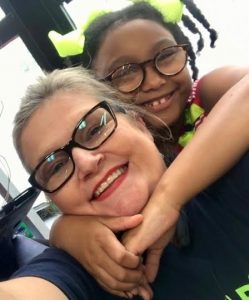
Point of Burnout: Finding Your Tribe
March 30, 2020
“… there is almost a period of grieving that has to happen.”
A child diagnosed with a disability is stressful, but what about what comes after?
Single mom Brandi Liberty stays busy juggling her two kids’ school and extracurricular schedules alongside the demands of her own job as a grant writer. Just over a year ago, her 9-year-old son, Carl, was diagnosed with autism spectrum disorder, raising the stress level of their already hectic lives.
[button color=”red” size=”normal” alignment=”center” rel=”follow” openin=”newwindow” url=”http://eepurl.com/gYhxYH”]Sign up to receive our monthly Inclusive NOLA newsletter![/button]
While Carl is largely social and attends school, he still needs six hours of Applied Behavior Analysis therapy a week. This means that Liberty spends three days of her work week traveling from the Westbank, potentially losing clients and income. Accommodations at school need to be constantly monitored and maintained with his teachers for missed work. Engulfed by her family’s daily schedule, Liberty began to resent her life.
Asking for Help
“Parenting any child is intense, and then you throw in special needs and all of the accompanying roles that parents then have to take on in addition to being just a ‘typical parent’ — it’s frequently very overwhelming,” says Dr. Terry Johnson, a local clinical psychologist.

Dr. Johnson works with families with special needs and mostly sees this type of burnout in parents of newly diagnosed children. Parents feel like they need to be doing everything possible to support their child, but they don’t know how to fit it all into their day.
In her sessions, Dr. Johnson has parents set small goals and reprioritize the needs of their child so that multiple therapies and appointments aren’t so daunting. She urges parents to tap into the special needs community to utilize resources and connect with other parents who are in similar situations. This helps to offset feelings of isolation and fosters socialization.
Dr. Johnson also stresses the importance of asking for help from your support system who want to help, but often don’t know how.
Liberty built a network that she can lean on, but it took her awhile to feel comfortable and vulnerable enough to ask for help. She sees a therapist, employs a nanny so she can leave the house to run errands, and has joined a Facebook group of moms of children with special needs.
“Find your tribe,” she says. “It’s OK to let your guard down and put your cards out on your table and say, ‘I need help.’”
Connect
Mary Jacob is the executive director of Families Helping Families of Greater New Orleans, a family resource center for parents of children with disabilities. They do not provide direct services, but they often connect parents and individuals to those that are providing the necessary resources, whether at a federal level or a more local, municipal one.
However, one of the main reasons that parents call the organization is to connect with other parents to receive advice that they might not get from professionals in the field.
“Parents just need validation that they aren’t going crazy and that this isn’t their fault,” Jacob says. She sees burnout mostly when a parent is the sole primary caregiver without support from anyone else. A typically-developing child will reach milestones and become independent, she says, yet parenting that child looks different than one who is dependent on you 100 percent of the time. Parents never get a break.
Positive Affirmations

Kerstin Shinn can relate to the all-consuming responsibilities of raising a child with disabilities. Her daughter, Aidia, was born premature with a host of medical problems including cerebral palsy, a congenital eye defect, and scoliosis. She has undergone nine surgeries, and much of Kerstin’s life has revolved around physical, speech, and occupational therapy for Aidia. She felt completely overwhelmed. She didn’t know what to do.
“Some of the problems that you have when dealing with someone with these needs, is you get too ahead of yourself and it gets really, really big,” Shinn says. Luckily, she was already seeing a psychologist who pointed out that she was going through burnout and needed some self-care.
Her therapist recommended a positive affirmations app that Shinn can listen to with ear buds at any point during the day. She tries to take short breaks, even if it’s a 15 minute walk around the block. Her favorite thing to do for herself is to sit and watch the wildlife on her birdfeeder that hangs from an oak tree in her backyard.
Aidia is now 8 and is in 2nd grade at a Belle Chasse elementary school where she makes the A/B honor roll. She still goes to her therapy sessions, but her schedule has become more manageable.
“She was like a little cracked egg,” Shinn says. “She has broken the shell and has exceeded everybody’s expectations. It was a lot of work and still is sometimes.”
Reaching Out
Some type of support group, formal or informal, is recommended for parents and caregivers of children with disabilities.
“When you have a child with special needs, they become your world and you might move away from friendships with parents who have neuro-typical kids,” says Dr. Lisa Settles, a clinical psychologist.
She is also the president of the Autism Society of Greater New Orleans and directs the Tulane Center for Autism and Related Disorders. Many of her parents meet and form friendships in the clinic while waiting for their child to be evaluated.
Dr. Settles also tells parents to seek out activities catered towards children with special needs where they can connect with families in similar situations.
“When a parent finds out that their child has a special need, there is almost a period of grieving that has to happen,” she says. The ideal images that they had in their mind of what their child will be, will need to be let go of and they will have to come up with new ideas of what life will look like.
Additionally, these parents always feel the need to be doing more and yet, no one has told them that they are adequate parents. Dr. Settles says that it is key for them to “take some time to realize how difficult it is and that they are doing a good job.”
 Sarah Herndon is a freelance writer, mom, and frequent contributor to Nola Family.
Sarah Herndon is a freelance writer, mom, and frequent contributor to Nola Family.
Read more about the Importance of Self-Care.

